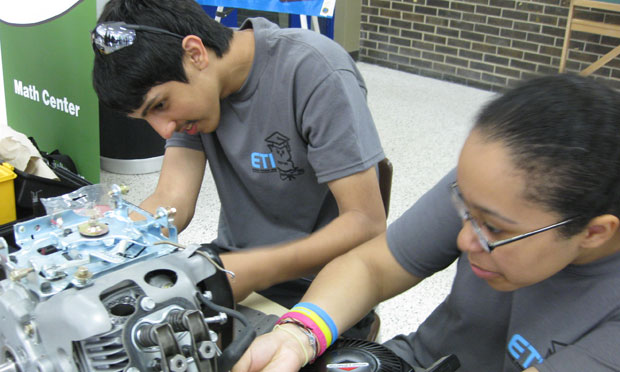As the school year has approached in fall 2015, the issue of serious teacher shortages across the country has come into focus, with certain districts dramatically lacking in sufficient numbers of quality candidates.
The root causes are thought to be at least partly economic: The Great Recession of 2007-09 resulted in mass layoffs and budget belt-tightening — prompting some educators to leave the profession — while a recent period of economic growth has presented more career options for would-be teachers. These realities have likely contributed to other notable teaching market-related shifts, such as fewer top graduates applying for the elite program Teach for America. It is also worth pointing out that, as the Washington Post‘s Valerie Strauss documents at some length, a growing dissatisfaction among teachers with the profession and the way it is administered is also likely at the heart of the shortage.
These trends are unfolding despite a heightened focus on the teaching profession over the past decade or so and a growing body of research that suggests teachers can have a vital impact on students’ later-life chances. Despite myriad federal programs and billions in foundation money targeted to improve public education, there are ongoing worries about the relative low quality of America’s school systems compared to those of other countries. A 2015 report from the Pew Research Center found that 46% of scientists and 29% of Americans rank the U.S. public school as below average in science, technology, engineering and math education. Some data confirm this pessimism: In the latest PISA study — an international measurement of reading ability, math and science literacy among 15-year-olds — U.S. students continued to struggle in certain areas, and in math it placed 35 out of 64 nations.
In a 2015 paper for the National Bureau of Economic Research “Weak Markets, Strong Teachers: Recession at Career Start and Teacher Effectiveness,” Markus Nagler from University of Munich, Marc Piopiunik from Ifo Institute of Economic Research and Martin R. West from the Harvard Graduate School of Education examine how the availability of economic opportunities outside schools impacts the effectiveness of teachers. In their dataset, the researchers match student test scores with information on teachers in Florida between 2001 and 2009. They then estimate a teacher’s value-added based on the change in students’ test scores in math and reading from grades 3 through 5 — a method of measuring teacher effectiveness that has gained much traction recently but is not uncontroversial. The researchers eventually correlate the NBER recession indicator to their estimates in order to control for the macroeconomic environment at the start of a teacher’s career.
The key findings include:
- Whereas the macroeconomic environment later in a teacher’s career doesn’t impact her effectiveness, teachers who start their careers during recessions and those who start their careers not during recessions have significantly different effects on student test score performance.
- Controlling for teaching experience, teachers starting in recessions have on average a 0.11 standard deviation higher math value-added than non-recession teachers. The researchers find a similar effect of 0.05 standard deviations when investigating a teacher’s reading value-added.
- This effect is not driven by a smaller number of less effective teachers but by a higher number of very effective teachers among those who start to work in a recession.
- Not all groups of teachers are impacted by recessions in the same way. “Male teachers seem to be more affected than female teachers which may suggest that the career options of men are more strongly influenced by recessions than those of women.” In addition, “minorities are more affected by recessions than whites.”
- Looking at teacher attrition, the researchers find that teachers starting in a recession are “slightly more likely to leave the public school system than non-recession teachers. More importantly, in recession cohorts, exiting teachers are significantly more effective compared to exiting non-recession teachers. This pattern works against our result, suggesting that the value-added gap is even larger at career start and decreases over time.”
- Using numbers in a 2014 paper from researchers at Harvard and Columbia, the authors estimate that the recession effect they find “translates into differences in discounted lifetime earnings of around $13,000 per classroom taught each school year by recession and non-recession teachers (evaluated at the average classroom size in our sample). This is equivalent to more than 20% of the average teacher salary in Florida.”
The authors conclude that the findings “strongly suggest that policymakers would be able to attract more effective individuals into the teaching profession by raising the economic benefits of becoming a teacher.” They state that “recessions serve as a window of opportunity for the public sector to hire more effective personnel than during normal economic periods. As teachers are a critical input in the education production function affecting students’ lives way beyond schooling, hiring more teachers in economic downturns would appear an attractive strategy to improve American education.”


Expert Commentary